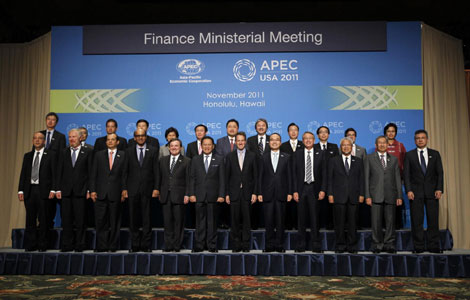Housing policy unwavering
Updated: 2011-11-07 07:52
By Ma Guangyuan (China Daily)
|
|||||||||||
Realty developers hope in vain for the government to loosen the tightened monetary policy so they can raise prices
As was expected, the traditional "golden September and silver October", the peak sales season for the country's housing market, did not materialize this year due to the introduction of a series of regulatory measures by the government.
The Beijing branch of China Construction Bank announced in mid-October its plan to raise mortgage interest rates for first-time homebuyers to 1.05 times the benchmark rate, in a move that is expected to deal another heavy blow to the subdued domestic real estate market.
The higher rates from the benchmark level mean homebuyers now have to pay an extra 5-30 percent for their home purchases. Considering the long-established "iron triangle" of banks, local governments and developers, the decision to raise mortgage rates at a time when the country's real estate regulations are at a critical juncture shows commercial banks' pessimistic outlook for the future of the domestic property market and a widening divide emerging between the different interest groups.
The increased burden as the result of the adoption of the raised rates will weaken the purchasing power of potential homebuyers and have a considerable influence on the future of the housing market. Commercial banks' ever-growing desire to pull themselves out of the "alliance of interests" they previously forged with local governments and developers augurs that the turning point for domestic housing prices is only a matter of time.
After more than one year of policy regulations by the government, the housing investment fever has subsided. As a result, the volumes of housing transactions have drastically declined and the "golden September and silver October" failed to arrive. The power struggle between developers and consumers has changed in favor of the consumers. In Beijing, Guangzhou, Shanghai and other first-tier cities, the volumes of home transactions have hit a three-year low. Property prices have even begun to show signs of falling. Statistics show that the September prices of newly built houses in 17 of 70 big and middle-sized cities nationwide declined from August and prices have stopped rising in the majority of the other cities. The amount of unsold houses in many cities has also reached a new high. It is estimated that about 15 months are needed to digest the unsold homes in 14 major cities. In Beijing alone, a total of 100,000 homes are yet to be sold, foreshadowing the coming of changes in supply-demand relations. In some cities where property prices soared in previous years, prices of some properties have already dropped to the 2009 level.
However, past experience tells us real estate regulation is always a complicated and arduous task and people should not be too hasty to cheer a final victory. The possibility of a new global economic recession triggered by the sovereign debt crises in the United States and the European Union have increased domestic developers' hopes that the regulatory measures will be weakened or suspended.
The long excessive dependence of local governments on revenues from land sales also encourages developers to stubbornly adhere to high prices despite the increased pressures they face. For example, some market analysts called on the authorities to relax the current monetary tightening policies to avoid a "hard landing" of the national economy immediately after publication of the September macroeconomic data showed that national economic growth has further slowed. But the average 9.4 percent economic growth in the first nine months of this year proves the absurdity of this. However, such an argument demonstrates the continuing attempts of some vested interest groups to work for a loosened monetary policy. At a time when nationwide housing prices have failed to rise appreciably, any signs of monetary relaxing is likely to give desperate developers renewed hopes of maintaining their current prices.
It is already a consensus among decision-makers that excessive dependence on the housing market poses a huge risk to the country's real economy. In an article in the September issue of Qiushi Magazine Premier Wen Jiabao said that the country's determination to press ahead with real estate regulations will "never waver", its policy direction will "never reverse" and its policy intensity will "never relax".
The author is an economist with the Chinese Academy of Social Sciences.
(China Daily 11/07/2011 page8)
Hot Topics
Libya conflict, Gaddafi, Oil spill, Palace Museum scandal, Inflation, Japan's new PM, Trapped miners, Mooncake tax, Weekly photos, Hurricane Irene
Editor's Picks

|

|

|

|

|

|







